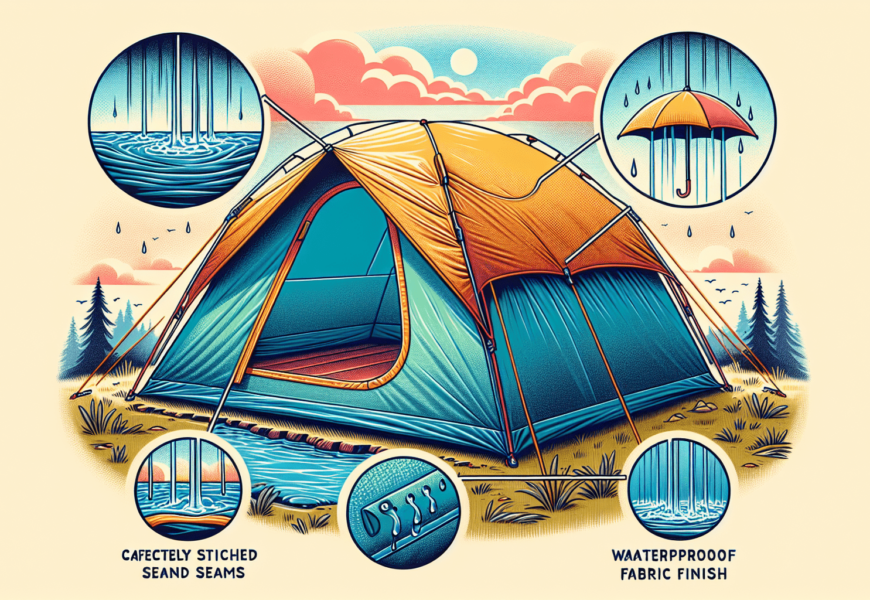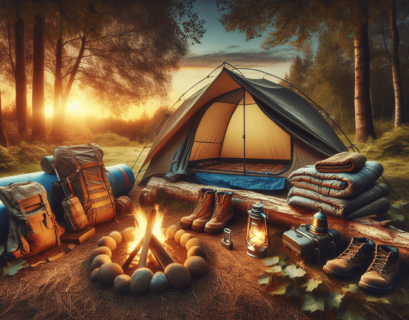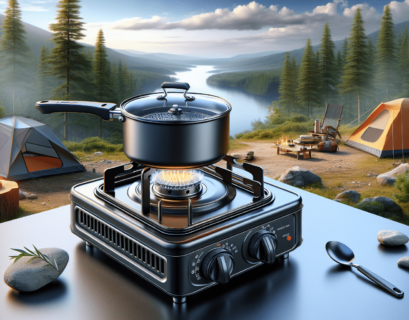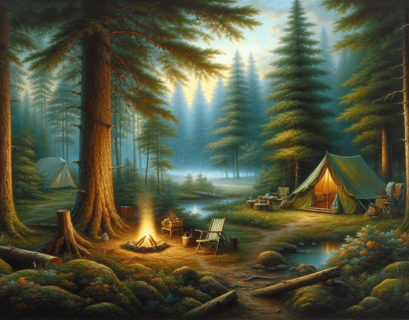Whether you’re a first-time camper or just need a refresher, this article will serve as your ultimate guide to all the essentials you’ll need for a successful camping trip. From sleeping bags and tents to cooking gear and safety items, we’ve got you covered with everything you need to know. So pack your sense of adventure and get ready to embark on a fun and memorable camping experience!
Understanding Camping Basics
Camping is a recreational outdoor activity that involves spending time in nature, away from the comforts of home. It allows you to disconnect from the fast-paced world and connect with the natural environment around you. Whether you’re a seasoned camper or a beginner, understanding some camping basics is essential for a successful outdoor experience.
Defining Camping
Camping can be defined as the act of setting up a temporary residence, such as a tent or RV, in a designated outdoor area for a certain period of time. It involves staying overnight or for multiple days, usually in designated camping grounds or remote areas. Camping is often associated with activities like hiking, fishing, and exploring nature.
Different Types of Camping
There are various types of camping, each offering a unique experience. “Car camping” refers to camping near your vehicle, allowing for easy access to amenities and gear. Backpacking” or “hiking camping” involves carrying all your gear on your back and traveling to remote locations on foot. “RV camping” entails using a recreational vehicle for accommodation, providing more amenities and comfort. “Glamping” is a glamorous version of camping, featuring luxurious amenities such as comfortable beds and electricity.
Health and Safety in Camping
Prioritizing health and safety while camping is crucial. Before embarking on your camping trip, ensure you’re in good physical condition and consult with a healthcare professional if needed. Pack a first aid kit with essentials like band-aids, antiseptic, and pain relievers. Remember to stay hydrated and protect yourself from insects, sunburn, and extreme weather conditions. It’s also important to familiarize yourself with the campsite rules and emergency procedures to ensure a safe experience for yourself and others.
Environmental Considerations for Campers
As a camper, it’s vital to be conscious of your impact on the environment and take steps to minimize it. Practice Leave No Trace principles by packing out your trash, minimizing campfire impact, and respecting wildlife and vegetation. Choose eco-friendly camping products and dispose of waste properly. It’s important to preserve the natural beauty of the outdoors for future generations to enjoy.
Choosing Your Camping Gear
Selecting the right camping gear is essential for a comfortable and enjoyable camping experience. Here are some key considerations when choosing your gear:
Selecting a Suitable Tent
When choosing a tent, consider factors like size, weight, durability, and ease of setup. Determine the number of people that will be using the tent and choose a size accordingly. Look for a tent with a good waterproof rating to keep you dry during rainy conditions. Consider the weight of the tent if you’ll be hiking or backpacking, as lighter options are more suitable for these activities.
Sleeping Bag Essentials
A good sleeping bag is crucial for a restful night’s sleep while camping. Consider the temperature rating of the sleeping bag, which indicates the lowest temperature at which it will keep you warm. Look for a sleeping bag with a comfortable material and the right amount of insulation for the weather conditions you’ll be camping in.
Backpack and Storage Solutions
If you’re backpacking or hiking to your camping location, a well-fitted backpack is essential for carrying your gear. Look for a backpack with adjustable straps and multiple compartments for easy organization. Consider the capacity of the backpack based on the duration and intensity of your camping trip. Additionally, invest in waterproof bags or dry sacks to keep your belongings dry in case of rain.
Choosing Appropriate Clothing
Pack clothing suitable for the weather conditions you’ll be camping in. Layering is key, as it allows you to adjust your clothing based on temperature changes throughout the day. Opt for moisture-wicking and quick-drying fabrics to keep you comfortable. Don’t forget to pack essentials like sturdy hiking boots, a hat, sunglasses, and a waterproof jacket.
Tent Options and Setup
Understanding different types of tents and how to set them up properly is essential for a successful camping trip. Consider the following factors when choosing and setting up your tent:
Types of Tents
There are several types of tents available, each suited for different camping needs. Dome tents are the most common and offer good stability and headroom. Tunnel tents provide ample space but may be less stable in windy conditions. Cabin tents are larger and offer more vertical space, making them suitable for family camping. Pop-up tents are easy to set up but may lack durability in harsh weather.
Tent Sizes and Capacity
Choose a tent size that suits the number of people you’ll be camping with. A 2-person tent is suitable for solo camping or couples, while larger tents can accommodate families or groups. Consider the height and width of the tent to ensure comfort and ease of movement.
Setting Up Your Tent
Before your camping trip, practice setting up your tent to familiarize yourself with the process. Start by selecting a suitable campsite, preferably on level ground and away from potential hazards like rocks or trees. Lay a groundsheet or tarp under your tent to protect it from moisture and damage. Follow the instructions provided by the manufacturer to assemble the tent poles, attach the rainfly, and secure the tent with stakes or guy lines.
Maintaining and Cleaning Your Tent
Proper maintenance and cleaning of your tent will prolong its lifespan and ensure it stays in good condition. Avoid placing the tent directly under sunlight for extended periods to prevent fabric deterioration. Clean your tent after each use using mild soap and water, and allow it to dry completely before packing it away. Store the tent in a cool, dry place to prevent mold or mildew growth.
Kitchen Essentials for Camping
Having the right kitchen essentials is essential for preparing meals while camping. Here are some key items to consider:
Camping Stoves and Cookwares
Invest in a reliable camping stove to cook your meals. There are different types available, such as propane stoves, multi-fuel stoves, and wood-burning stoves. Choose a stove that suits your cooking needs and fuel availability. Don’t forget to pack cookware essentials like pots, pans, utensils, and a camping kettle for boiling water.
Portable Refrigeration Options
If you’re camping for an extended period or in hot weather, portable refrigeration can be beneficial. Consider options like coolers or portable fridges to keep perishable food items fresh. Pack your cooler with ice or ice packs to maintain the desired temperature.
Essential Eating Utensils
Pack lightweight and durable eating utensils like plates, bowls, cups, and cutlery. Opt for reusable options to minimize waste. Don’t forget to pack essentials like a can opener, bottle opener, and a camping coffee maker if you’re a coffee lover.
Keeping Your Food and Water Safe
Proper food and water storage are crucial to avoid foodborne illnesses while camping. Keep perishable items in airtight containers or coolers to prevent spoilage. Store food away from your sleeping area to minimize the risk of attracting animals. Use a water filtration system or pack bottled water to ensure a safe drinking water supply.
Tool and Safety Equipment
Having the right tools and safety equipment is essential for a safe and enjoyable camping trip. Consider the following items:
Camping Knife or Multi-Tool
A camping knife or multi-tool is a versatile and essential item for various camping tasks such as cooking, cutting, and repairing gear. Choose a knife or multi-tool with a strong and sharp blade, as well as additional features like a can opener or screwdriver.
Ropes and Paracords
Ropes and paracords are useful for setting up tarps, securing tents, and hanging clothes or food out of reach of wildlife. Pack a variety of ropes with different lengths and thicknesses to accommodate different needs. Learn basic knot tying techniques to ensure proper use.
Flashlights and Lighting
Having reliable lighting is crucial, especially during nighttime or in low-light conditions. Pack durable flashlights or headlamps and extra batteries. Consider solar-powered or rechargeable options to minimize environmental impact.
First Aid Kits and Essentials
A well-stocked first aid kit is essential for quickly treating minor injuries or medical emergencies. Include items like band-aids, antiseptic ointment, tweezers, gauze, adhesive tape, and pain relievers. Familiarize yourself with basic first aid techniques or consider taking a first aid course before your camping trip.
Navigation and Communication Devices
Knowing your way and staying connected while camping is important for safety and enjoyment. Consider the following devices:
Camping Compass Basics
A camping compass is a valuable tool for navigating and finding your way in the outdoors. Learn how to read a compass and understand basic navigation techniques. Consider a compass with additional features like a built-in thermometer or magnifying glass.
Understanding GPS Devices for Camping
Global Positioning System (GPS) devices are another useful tool for navigation while camping. They provide accurate information about your location and can track your movements. Familiarize yourself with the features and functionality of your GPS device to make the most of it.
Emergency Communication Devices
Having a reliable means of communication is crucial in case of emergencies. Consider devices like two-way radios, satellite phones, or personal locator beacons (PLBs). Ensure you have a clear understanding of how to use these devices and familiarize yourself with emergency protocols.
Using Traditional Maps
While GPS devices and compasses are useful, it’s always a good idea to have traditional maps as a backup. Pack detailed maps of the area you’ll be camping in and familiarize yourself with the key landmarks and routes. Maps can be invaluable if your electronic devices fail or if you prefer a more traditional navigation method.
Outdoor Personal Hygiene
Maintaining personal hygiene while camping is essential for your comfort and well-being. Consider the following hygiene essentials:
Portable Camping Showers
Portable camping showers are a great way to stay refreshed and clean during longer camping trips. There are various options available, from solar-powered showers to manual pumps. Choose a shower that suits your needs and remember to pack biodegradable soap and shampoo.
Campsite Toilet Solutions
Many campgrounds provide restroom facilities, but if you’re camping in remote areas, you may need to plan for proper waste disposal. Portable camping toilets or biodegradable toilet bags are convenient options. Ensure you follow proper waste disposal guidelines and respect the environment.
Keeping Clean While Camping
Maintaining cleanliness while camping can be challenging, but it’s still important. Pack biodegradable wet wipes, hand sanitizer, and eco-friendly soap for washing dishes. Bring a small portable basin or collapsible sink for washing up. Choose clothes that dry quickly and consider packing a clothesline or drying rack.
Environmentally-Friendly Hygiene Products
When selecting hygiene products, opt for environmentally-friendly options whenever possible. Look for biodegradable soaps, shampoos, and toothpaste to minimize your impact on the environment. Dispose of these products properly and avoid using any harsh chemicals in natural water sources.
Stay Equipped for Different Weather Conditions
Being prepared for different weather conditions is crucial for a comfortable camping trip. Consider the following essentials:
Sun Protection Gear & Precautions
Protecting yourself from the sun is important to prevent sunburn and heat-related illnesses. Pack sunscreen with a high SPF, sunglasses, and a wide-brimmed hat. Wear lightweight, breathable clothing that covers your skin and consider seeking shade or using a portable canopy during the hottest parts of the day.
Handling Rain and Storms at Campsite
Rain and storms can quickly turn a camping trip into a soggy experience. Pack waterproof gear, including a rainfly for your tent and a waterproof jacket. Consider setting up a tarp over your campsite to provide additional shelter. Store your gear in waterproof bags or containers to keep them dry.
Dealing with Cold Weather
If you’ll be camping in cold weather, proper insulation and layers are essential. Pack thermal clothing, warm hats, gloves, and socks. Invest in a high-quality sleeping bag and consider using sleeping bag liners or blankets for extra warmth. Avoid wearing cotton clothing, as it retains moisture and can make you feel colder.
Food and Water Essentials
Properly planning your food and water supply is crucial for a successful camping trip. Consider the following essentials:
Choosing Easy-to-Pack Food Items
When camping, it’s important to pack food that is easy to prepare and transport. Consider non-perishable items like canned goods, dried fruits, nuts, granola bars, and instant meals. Don’t forget to pack a camping stove or fire starters for cooking. Plan your meals ahead and store food in airtight containers to prevent spoilage.
Hydrating Properly While Camping
Staying hydrated is key to maintaining your energy and well-being while camping. Pack plenty of water, considering the daily water needs of each camper. If you’re camping in an area with access to natural water sources, consider carrying a water filtration system or purification tablets to ensure safe drinking water.
Camp Cooking Basics
Cooking while camping can be a fun and rewarding experience. Pack essential cooking utensils like pots, pans, cooking spoons, and a grill grate if you plan to have a campfire. Plan meals that are easy to prepare and clean up. Bring ingredients that don’t require refrigeration or spoil quickly.
Enjoying and Respecting the Outdoor
Part of the camping experience is enjoying and respecting the natural environment. Consider the following guidelines:
Engaging in Outdoor Activities
Camping offers a myriad of outdoor activities to enjoy. Hiking, fishing, birdwatching, and stargazing are just a few examples. Research the area you’ll be camping in and familiarize yourself with local regulations and restrictions. Always be respectful of wildlife, vegetation, and other campers while enjoying outdoor activities.
Observing Wildlife With Respect
Encountering wildlife is one of the highlights of camping, but it’s important to observe them from a safe distance and avoid feeding or approaching them. Respect their natural habitat and do not disturb or harm them. Keep food properly stored to prevent attracting animals to your campsite.
Leaving No Trace Behind
One of the most important principles of camping is to leave no trace of your presence. Pack out all trash and dispose of it properly. Minimize your impact on the environment by following designated trails, staying on designated campsites, and avoiding damage to vegetation. Leave the campsite in the same (or better) condition than you found it.
Campfire and Outdoor Safety
Campfires can add warmth and ambiance to your camping experience, but it’s important to use them responsibly. Follow campfire safety guidelines, including checking fire regulations and restrictions in the area. Ensure the fire is properly extinguished before leaving the campsite or going to bed. Always have a bucket of water or a fire extinguisher nearby.
Camping can be an incredible experience that allows you to connect with nature and create lasting memories. By understanding camping basics, choosing the right gear, and practicing responsible outdoor ethics, you can ensure a safe and enjoyable adventure. So grab your gear, pitch your tent, and get ready to embark on a thrilling camping journey!







